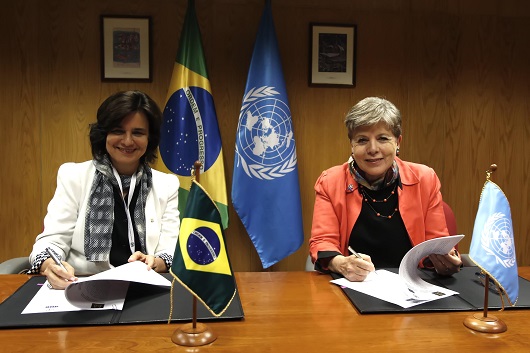Fiocruz and ECLAC sign international cooperation agreement

06/06/2018
André Costa (Agência Fiocruz de Notícias)
On April 19, Fiocruz and the Economic Commission for Latin America and the Caribbean (ECLAC) signed an international cooperation agreement aimed at compliance with the 2030 Agenda for Sustainable Development. Signed by Fiocruz President, Nísia Trindade Lima, and ECLAC Executive Secretary, Alicia Bárcena, in Santiago do Chile, where the Latin American and Caribbean Countries Forum on Sustainable Development was held, the document provides for collaboration among the institutions in initiatives that link socio-economic development and health.
Planned activities include joint development and implementation of research and prospecting projects, academic exchange of researchers and students, exchange of information and technical documentation on the relationship between development and health, joint organization of workshops and joint publication of articles and scientific papers.
The instrument also establishes the creation of platforms and other devices to produce and disseminate knowledge on the relationships between development and health, the development of social technologies that contribute to improvements of quality of life and that the parties cooperate for the development of sustainable territories, among other topics.
According to the president of Fiocruz, the agreement "works out the economic, social and environmental dimensions in an articulated way, which is essential for our view of the 2030 Agenda. It also understands the Sustainable Development Goals (SDGs) from a point of view of rights and social participation, something very important to us. This document enables the implementation of a very broad agenda, possible from the convergence between how Fiocruz and ECLAC understand the 2030 Agenda".
ECLAC director in Brasília, Carlos Mussi, said that the agreement "will bring the experience of economic and social development area of the Commission to Fiocruz. We hope to contribute to a better qualification on styles and strategies of economic development. We also offer reflections on the strategies of the economic and industrial health complex, which implies gains in innovation and competitiveness. We will think how this complex can satisfy SUS, whether it will serve exclusively the public sector or the private sector as well, and if exports can be made possible, etc.”
Read also: 2030 Agenda: combating social inequalities is essential


